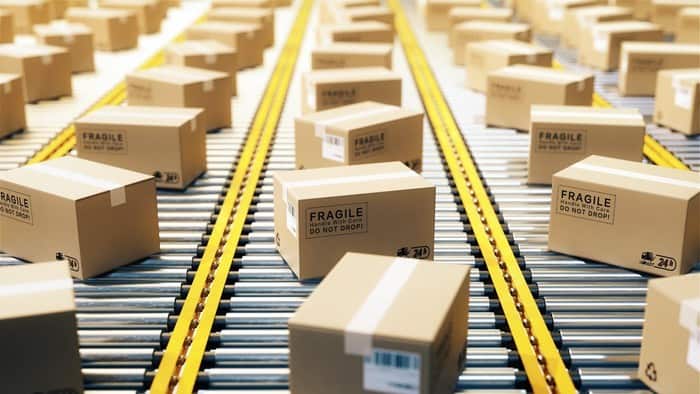This article was originally published on Fool.com. All figures quoted in US dollars unless otherwise stated.
Amazon (NASDAQ: AMZN) is no stranger to antitrust lawsuits. Just the other day, California filed a suit against Amazon alleging anticompetitive pricing policies. This filing isn't the first time these allegations have come up, and it likely won't be the last.
Because of the current environment, it's not a far-fetched idea that Amazon could be split up voluntarily or by the government. It's a worthwhile exercise to value each business segment of the company separately for two reasons. First, it could prepare investors for a split. Second, it also serves as a method to value the company and determine if it's worth an investment today.
Let's see how each segment is valued and if Amazon is worth your investment dollars.
A large business with multiple segments
Amazon's business can be split into two main segments: commerce and cloud computing. Commerce is much broader than the website you order items from. It also includes advertising, third-party seller services, and subscription products. Cloud computing, better known as Amazon Web Services (AWS), provides the infrastructure to process workloads through the cloud.
The commerce segment also generates the bulk of Amazon's revenue. Over the past 12 months, the company brought in $485.9 billion in sales overall, and 85% of that came from commerce. However, that segment hasn't made any money over the past year. It lost $7.1 billion; whereas, AWS made $22.4 billion in operating income.
Those figures group all of the many commerce segments together. Amazon doesn't break out its expenses for each segment, but it does break out its sales.
| Segment | Q2 Net Sales | Q2 YOY Growth | Share of
Total Revenue |
|---|---|---|---|
| Online stores | $50.9 Billion | 0% | 42% |
| Physical stores | $4.7 Billion | 13% | 4% |
| Third-party seller services | $27.4 Billion | 13% | 23% |
| Subscription services | $8.7 Billion | 14% | 7% |
| Advertising services | $8.8 Billion | 21% | 7% |
| Amazon Web Services (AWS) | $19.7 Billion | 33% | 16% |
| Other | $1.1 Billion | 135% | 1% |
Source: Amazon. YOY = year over year.
This table provides valuable insights. First, its online-store segment didn't grow its sales but is still the largest. Second, AWS is the fastest-growing segment (the "other" segment is volatile, so growth likely isn't sustainable) and the second largest. Lastly, advertising services still grew 21% year over year during a difficult ad environment.
Overall, Amazon's quarter was strong; it was just dragged down by its largest segment having difficult comparisons, because 2021's second quarter was still during the height of COVID-19. But should the company need to be split, it's challenging to determine which segments would go where.
AWS would likely need to be its own entity because it is unrelated to commerce. Advertising could be seen as a conflict of interest, as it should theoretically be a neutral marketplace. One seller could pay Amazon to place its product above other similar ones, even if it is lower rated or more expensive. The rest of the divisions -- online stores, physical stores, third-party services, and subscriptions -- could remain a separate company.
That leaves three separate businesses: cloud computing, advertising, and commerce. Now it's time to determine what each business is worth.
Valuation by parts
To determine what each entity is worth, I'll apply a valuation comparable to companies that perform services similar to the newly formed Amazon businesses. While this approach has flaws, it's a good way to estimate a valuation for each business.
First, investors could compare the commerce business to retail giants like Target Corporation (NYSE: TGT) or Wal-mart Stores, Inc.(NYSE: WMT). These two trade for 0.7 and 0.6 times sales, respectively. While these two companies have a more expensive physical footprint, Amazon has to pay for delivery. However, unlike Amazon's commerce business, Walmart and Target are consistently profitable. Because of this, I will apply a valuation of 0.5 times sales to Amazon's commerce business.
For advertising, The Trade Desk (NASDAQ: TTD) is a similar business. Its ad-tech platform connects buyers to sellers to ensure advertisers get the best results. Amazon's platform has similar capabilities but also deals directly with ads, unlike The Trade Desk. Because of this, I'm going to discount this business significantly. The Trade Desk is valued at 22 times sales, but I'm going to cut that in half for Amazon's ad business to 11 times sales.
Lastly, AWS is likely the most valuable. It's growing quickly and is highly profitable. Its two main competitors, Microsoft's (NASDAQ: MSFT)Azure and Alphabet's (NASDAQ: GOOGL)(NASDAQ: GOOG)Google Cloud, aren't stand-alone companies, so a valuation can't be deduced from them.
There aren't many businesses like it, but Adobe Inc.(NASDAQ: ADBE) comes close. The product isn't close to AWS, but its subscription revenue stream and high operating margins (35%) are similar to AWS. Adobe trades at 8.5 times sales, which is influenced by recent acquisition news. Before then, it traded at 11 times sales. I'll apply a valuation of 13 times sales to AWS to adjust for this drop and account for AWS' faster sales growth.
Now, let's see the value of all three businesses.
| Business | TTM Revenue | P/S Valuation | Business
Valuation |
|---|---|---|---|
| Commerce | $379.9 Billion | 0.5 | $189.9 Billion |
| Advertising | $33.9 Billion | 11 | $372.9 Billion |
| AWS | $72.0 Billion | 13 | $936.0 Billion |
Source: Amazon. P/S = price to sales. TTM = trailing 12 months.
Now, let's add up those three segments. Using this method, Amazon's entire business is worth $1.5 trillion. However, its current market cap is $1.26 trillion. That means, according to my valuation method, the company's stock is currently undervalued by 19%.
So, if Amazon gets broken up by regulators or through its own decision, investors will likely make a quick profit through a split. But that action might not happen.
One thing that is certain is that investors can purchase Amazon's stock today. With its recent price movement, it looks undervalued, and investors should consider establishing a position and holding it for an extended period, even if it gets broken up.
This article was originally published on Fool.com. All figures quoted in US dollars unless otherwise stated.









